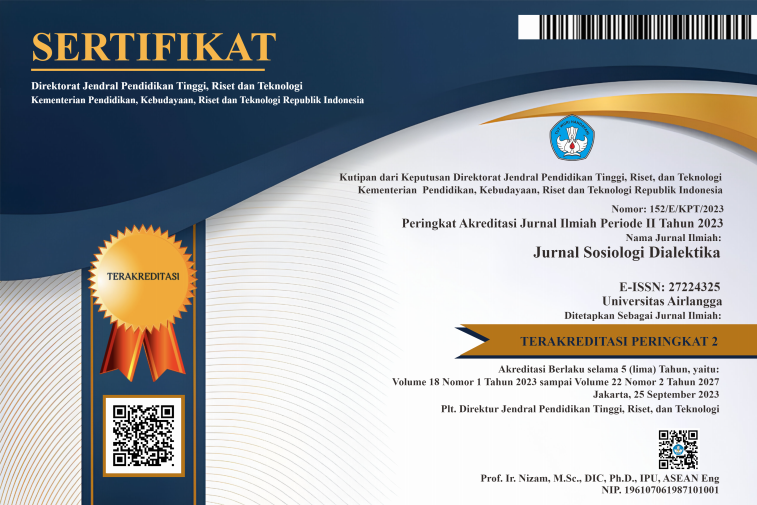Female adolescents and the use of contraceptives in rural areas
Downloads
Contraception is an effort used to prevent pregnancy in women of childbearing age. Presently, contraception is not only used for adult women or those who have had a partner, but also for female adolescents. This study aimed to understand the practice of using contraceptives among female adolescents in rural areas. The theory used as an analytical tool was the theory of social construction by Peter L Berger and Thomas Luckmann. This study used a qualitative method. The research subjects in this study were women who used contraceptives as an adolescent. This study showed that the use of contraceptives or family planning by female adolescents in the Kabuh District is a common practice. Female adolescents interpreted family planning practices as prevention of pregnancy. The most commonly used contraceptives are the contraceptive injection and the birth control pill. Adolescents obtained preference for contraceptives from their parents and family. Meanwhile, family planning services were only provided through a midwife using the One-Stop Service method. Cultural values and customs that are deeply rooted in the Manduro community make the practice of pre-marital family planning perpetuated, even though it contradicts information in general and religion. This study concluded that the practice of pre-marital family planning is believed to be the best solution for female adolescents who are engaged but still want to seek new experiences.
Afrilia EM & Cahyanti YD (2017) Hubungan sikap remaja dengan penggunaan kontrasepsi pada anak jalanan. JKFT 2: 8-13.
Amod Z, Halana V, & Smith N (2019) School going teenage mothers in an under-resourced community: Lived experiences and perceptions of support. Journal of Youth Studies 22 (9):55-71.
Arisukwu O, Igbolekwu O, Efugha I, Nwogu J, Osueke N, & Oyeyipo E (2019) Knowledge and perception of emergency contraceptives among adolescents girls in Imo State, Nigeria. Sexuality & Culture 24: 273-290.
Ariyani Y (2021) Aksi borong kondom pada pelajar di Kabupaten Pamekasan, Madura. Masyarakat, Kebudayaan dan Politik 21 (2):181-186.
BAPPENAS (2021) 3. Kehidupan sehat dan sejahtera. [Accessed 21 July 2021]. https://sdgs.bappenas.go.id/tujuan-3.
Berger PL & Luckmann T (1990) Tafsir Sosial Atas Kenyataan: Risalah tentang Sosiologi Pengetahuan. Jakarta: LP3ES.
BKKBN & CNN Indonesia (2020) BKKBN nilai pernikahan dini sebagai bencana nasional. [Accessed 09 August 2021]. https://www.cnnindonesia.com/gaya-hidup/20200703183717-289-520695/bkkbn-nilai-pernikahan-dini-sebagai-bencana-nasional.
BKKBN Jatim (2019) Lakip Perwakilan BKKBN Provinsi Jawa Timur. Surabaya: BKKBN.
BPS Kabupaten Jombang (2019) Kecamatan Kabuh Dalam Angka. Jombang: BPS.
Devi RA & Sulistyo R (2019) Gambaran kepesertaan keluarga berencana di Provinsi Jawa Timur tahun 2018. Media Gizi Kesmas 8 (2):1-9.
Dwi A (2012) Memilih Alat Kontrasepsi Alami dan Halal. Solo: Aqwamedika.
Dwi A (2020) Tahun 2020, jumlah pernikahan dini melonjak 100 persen. Kabarjombang.com, 17 November. [Accessed 21 July 2021]. https://kabarjombang.com/peristiwa/tahun-2020-jumlah-pernikahan-dini-di-jombang-melonjak-100-persen/.
Fisher C, Kerr L, Ezer P, Kneip P, Coleman J, & Tibbits M (2019) Adolescents perspectives on addressing teenage pregnancy and sexually transmitted infection in the classroom and beyond. Sex Education 20 (1):90-100.
Irani M & Robab LR (2019) Reproductive and sexual health consequences of child marriage: A review of literature. Journal of Midwifery and Reproductive Health 7 (1):1491-1497.
Kemenkes RI (2012) Pedoman Sistem Pencatatan dan Pelaporan Pelayanan Keluarga Berencana. Jakarta: Kemenkes.
Kemenkes RI (2015) Buku Pedoman Pelayanan Kesehatan Reproduksi Terpadu di Tingkat Pelayanan Kesehatan Dasar. Jakarta: Direktorat Bina Kesehatan Ibu.
Listyowati R, Nopiyani N, & Indrayathi P (2017) Perception of contraception access and utilization in teenagers in Senior High School No 8 Denpasar, Bali. Journal of Health Science and Medicine 1 (2):27-30.
Magnusson B, Masho S, & Lapane KL (2012) Early age at first intercourse and subsequent gaps in contraceptive use. Journal of Women's Health 21 (1):73-79.
Manlove JR & Franzetta K (2003) Pattern of contraceptive use within teenagers first sexual relationship. Perspective on Sexual and Reproductive Health 35 (6):246-255.
Maridjan GN (2019) Aborsi dalam penerapan hukum pidana di Indonesia. Lex Crimen 8 (6):114-121.
Maulida A (2016) Fenomena Penyalahgunaan Alat Kontrasepsi. Thesis, Universitas Islam Negeri Ar Raniry, Banda Aceh.
Mekonnen T, Dune T, & Pers J (2019) Maternal health service utilization of adolescent woman in Sub Saharan Africa: A systematic scoping review. BMC Pregnancy Childbirth 19: 1-16.
Musafaah M (2007) Pengetahuan dan sikap pemakaian kontrasepsi pada remaja putri gaul di Parkir Timur Senayan, Jakarta. Jurnal Kesehatan Masyarakat Nasional 22 (2):91-96.
Ottesen S, Narring F, Renteria S, & Michaud PA (2020) Emergency contraception among teenagers in Swizterland: A cross sectional survey on the sexuality of 16 to 20 years old. Journal of Adolescent Health 31 (1):101-110.
Planification Familiale (2016) WHO releases new fact sheets on adolescent contraceptive use. [Accessed 09 August 2021]. https://partenariatouaga.org/en/releases-new-fact-sheets-adolescent-contraceptive-use/.
Rohmah N, Yusuf A, Hargono R, Laksono AD, Masruroh, Ibrahim I, & Walid S (2020) Determinants of teenage pregnancy in Indonesia. Indian Journal of Forensic Medicine & Toxicology 14 (3):2105-2110.
Sa'adah SF (2019) Pengambilan keputusan suami istri dalam menentukan pendidikan anak: Studi pada Muslimat Hidayatullah Surabaya. Jurnal Sosiologi Dialektika 14 (2):111-119.
Saputra H (2014) Persepsi remaja terhadap hubungan interpersonal laki-laki dan perempuan: Studi di Kecamatan Manggeng Kabupaten Aceh Barat Daya. Thesis, Universitas Islam Negeri Ar Raniry, Banda Aceh.
Suratun S, Tien H, & Rusmiati S (2008) Pelayanan Keluarga Berencana dan Pelayanan Kontrasepsi. Jakarta: Trans Info Media.
Suyanto B & Sutinah (2007) Metode Penelitian Sosial Berbagai Alternatif Pendekatan. Jakarta: Prenadamedia Group.
Tayo A, Akinola O, Babatunde A, Adewunmi O, & Shittu L (2011) Contraceptive knowledge and usage amongst female secondary school students in Lagos, Southwest Nigeria. Journal of Public Health and Epidemiology 3 (1):34-37.
Zer S, Wainstok T, Walfish A, & Sheiner E (2019) Perinatal outcomes and long-term health in offspring of teenage mothers. Journal Pediatri Adolescent Gynecol 32 (6):1-22.
1. Copyright of this journal is possession of Editorial Board and Journal Manager, by the knowledge of author, whilst the moral right of the publication belongs to the author.
2. Legal formal aspect of journal publication accessibility refers to Creative Commons Attribution-NonCommercial-ShareAlike (CC BY-NC-SA), implies that publication can be used for non-commercial purposes in its original form (cannot be modified).
3. Every publications (printed/electronic) are open access for educational purposes, research, and library. Other that the aims mentioned above, editorial board is not responsible for copyright violation.















